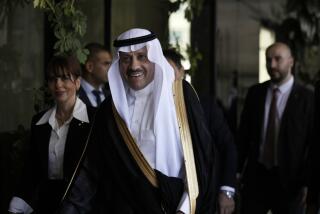Saudi Envoy in L.A. Is Deported
- Share via
A Saudi consular official and Muslim prayer leader based in Los Angeles was denied entry to the United States this week and expelled from the country because of suspected terrorist links, according to law enforcement officials and documents.
Fahad al Thumairy, 31, part of the Saudi Consulate here since 1996, was detained at Los Angeles International Airport on Tuesday after arriving on a Lufthansa flight from Frankfurt. He carried a Saudi passport and an A-2 visa normally issued to diplomats or government dignitaries.
U.S. authorities, acting on undisclosed intelligence information, revoked the visa in March -- a fact apparently unknown to al Thumairy.
After two days in custody, al Thumairy was expelled from the country Thursday and put aboard a Frankfurt-bound flight with connections to Saudi Arabia, officials said. The terms of his expulsion ban him from returning to the United States for five years.
“He was placed on an international flight, destined for Riyadh,” said Virginia Kice, a spokeswoman for the Department of Homeland Security.
At the consulate, al Thumairy held a diplomatic post in the Islamic and cultural affairs section. He also served as a prayer leader at the King Fahd Mosque in Culver City, one of Southern California’s largest Muslim houses of worship.
A many as 1,000 worshipers gather at the blue and white mosque on Fridays, the Muslim holy day. The worshipers include many immigrants from Asia, Africa, the Middle East and elsewhere, along with U.S.-born Muslims.
The Saudi government helped finance construction of the King Fahd Mosque, part of the government’s practice of promoting Islam abroad.
The Arab kingdom also funds construction of other mosques, prints and distributes Korans, and provides prayer leaders and religious speakers worldwide. Members of the Saudi royal family, including the ailing King Fahd, view themselves as the caretakers of Islam and its holiest shrines.
Since Sept. 11, 2001, U.S. officials have stepped up scrutiny of visa applicants from Saudi Arabia and other Muslim nations, while launching a program to register and question those who come to the United States. Saudis and other Arabs have complained that it has become extremely difficult to visit the United States. The number of visas issued to Saudi Arabians plummeted almost 70% in fiscal 2002, to about 14,100.
U.S. authorities canceled al Thumairy’s visa March 21. One source said a State Department communique specifically mentioned that al Thumairy had suspected affiliation with terrorists. Further details were not available.
Officials placed his name on a computerized list of travelers who should be denied entry to the United States because of suspected links to terrorism, criminal records or other reasons. When he arrived at the airport, inspectors noted the alert, directed him for additional inspection and discovered that his visa was no longer valid.
His detention prompted a flurry of telephone calls to Washington and the arrival of agents from the FBI, the Joint Terrorism Task Force -- a multi-agency group -- and other security services. Al Thumairy was interrogated for several hours but, according to one official, did not offer much.
“He was fairly clammed up, and kept to himself,” the official said. “He shut his mouth and didn’t ask for anything.”
Knowledgeable observers said the fact that al Thumairy was allowed to leave the country indicates there was no direct evidence linking him to extremists. “If he were a terrorist and we thought he would do harm, we wouldn’t have deported him,” said one Justice Department official, speaking on condition of anonymity.
Saudi consular officials from Los Angeles tried to reach al Thumairy -- one attempted to deliver a prayer rug while he was at the airport, an official said -- but were unable to speak with him.
Officials of the Saudi Consulate in Los Angeles and the Saudi Embassy in Washington declined to comment on the matter.
Al Thumairy is a religious expert whose scholarship on Islam has earned him the title shaikh -- roughly, “learned one” -- even though he is only 31. Officials at the King Fahd Mosque described him as an extremely spiritual, beloved and nonviolent man whose sermons and conversation never veered to the political. They said he explicitly condemned terrorism and the attacks of Sept. 11.
“Shaikh Fahad was a very religious person -- he never dealt with politics, in his public comments or in private gatherings,” said Tajuddin Shuaib, a native of Ghana who directs the mosque, which is run by a nonprofit group. “Like the rest of us, he was really shocked about Sept. 11. He felt it was wrong and, in the long term, that it would harm Muslims. His impression was that it would have some bad repercussions.”
Mosque leaders said they were happy to have him as their imam because of his great knowledge and the fact that his status as an employee of the Saudi government saved them the expense of hiring a prayer leader. However, Shuaib stressed that his presence was a convenience, not a mandate from Saudi Arabia. Al Thumairy traveled frequently to Saudi Arabia, including a recent trip back for the Hajj, the holy pilgrimage to Mecca that all Muslims strive to undertake. He had recently left again for Saudi Arabia and was expected back this week.
Oil-rich Saudi Arabia has long been a key ally of Washington in the Middle East, but the attacks of Sept. 11 -- and the revelation that 15 of the 19 hijackers were Saudi nationals -- have introduced new tensions in relations between the two nations. Saudi officials have angrily denied reports that some hijackers may have received financial support from government representatives.
Riyadh has also stressed its role in hunting down militant followers of the Saudi-born Osama bin Laden.
*
Times staff writer Greg Krikorian contributed to this report.
More to Read
Sign up for Essential California
The most important California stories and recommendations in your inbox every morning.
You may occasionally receive promotional content from the Los Angeles Times.













